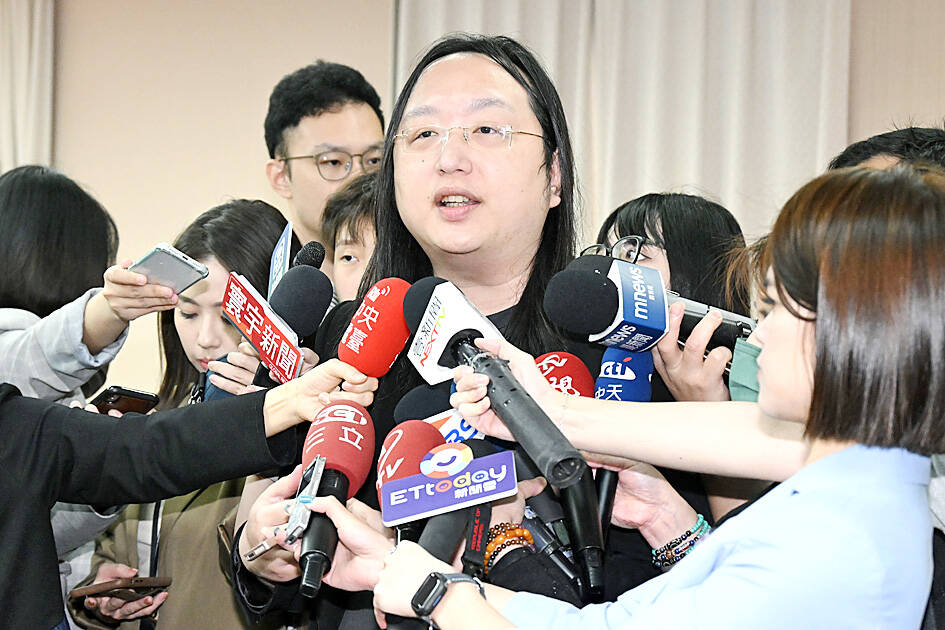The National Science and Technology Council (NSTC) is compiling guidelines on the use of artificial intelligence (AI) in government agencies after several local governments announced plans to use ChatGPT to offer services to residents, Minister of Digital Affairs Audrey Tang (唐鳳) said yesterday.
Tang made the remark at a meeting of the legislature’s Transportation Committee as she and other officials briefed lawmakers on measures that the government would take to prevent personal data breaches as people increasingly file their taxes online and conduct business using ChatGPT.
Taoyuan is planning to use ChatGPT in its 1999 city government hotline, while Tainan has developed an auxiliary teaching module using the AI app.

Democratic Progressive Party (DPP) Legislator Lee Kun-tse (李昆澤) said many governments and private corporations around the world have begun using ChatGPT, but countries such as Italy have banned the use of the technology due to privacy concerns.
He asked Tang whether Taiwan would ban civil servants from accessing ChatGPT or other generative AI applications to conduct government affairs.
Tang said Italy lifted the ban on ChatGPT after the developer, OpenAI, implemented changes Rome asked for.
The NSTC is compiling a guidebook on the use of generative AI applications in government agencies, Tang said.
“Two major principles will be stated in the guidebook. One is that government workers must not submit content generated by generative AI systems without scrutinizing it. Different from content found through search engines, content created by generative AI systems can come out of nowhere. They could be untruthful statements that appear to be logical,” she said.
Second, personal data breaches can be prevented if government departments only use AI systems when they are not connected to the Internet and instead use local servers over which they have full control, she said.
Regarding the risks of data leaks at companies using AI, Tang said that corporations should always be careful not to leak confidential information to the public.
“The problem is that most corporations depend too much on AI language models available online because they are convenient to use. If corporations could themselves develop similar AI applications that are just as convenient to use as ChatGPT, they need not access the online chatbot and risk having data leaks,” she said.
The National Institute of Cyber Security is building a Taiwanese AI framework and is planning to work with the Industrial Technology Research Institute (工業技術研究院) on related projects in the second half of this year, she said.
The NSTC is scheduled to introduce a “trustworthy AI dialogue engine” to the public by the end of this year, Tang said, adding that the National Institute of Cyber Security would be in charge of authenticating the intermediary versions of the dialogue engine.
“Any organization should use the local technology or work with trusted local cloud providers so as not to upload all data to the free public cloud, which will lead to concerns about data leaks,” she said.

A Chinese aircraft carrier group entered Japan’s economic waters over the weekend, before exiting to conduct drills involving fighter jets, the Japanese Ministry of Defense said yesterday. The Liaoning aircraft carrier, two missile destroyers and one fast combat supply ship sailed about 300km southwest of Japan’s easternmost island of Minamitori on Saturday, a ministry statement said. It was the first time a Chinese aircraft carrier had entered that part of Japan’s exclusive economic zone (EEZ), a ministry spokesman said. “We think the Chinese military is trying to improve its operational capability and ability to conduct operations in distant areas,” the spokesman said. China’s growing

Nine retired generals from Taiwan, Japan and the US have been invited to participate in a tabletop exercise hosted by the Taipei School of Economics and Political Science Foundation tomorrow and Wednesday that simulates a potential Chinese invasion of Taiwan in 2030, the foundation said yesterday. The five retired Taiwanese generals would include retired admiral Lee Hsi-min (李喜明), joined by retired US Navy admiral Michael Mullen and former chief of staff of the Japan Self-Defense Forces general Shigeru Iwasaki, it said. The simulation aims to offer strategic insights into regional security and peace in the Taiwan Strait, it added. Foundation chair Huang Huang-hsiung

PUBLIC WARNING: The two students had been tricked into going to Hong Kong for a ‘high-paying’ job, which sent them to a scam center in Cambodia Police warned the public not to trust job advertisements touting high pay abroad following the return of two college students over the weekend who had been trafficked and forced to work at a cyberscam center in Cambodia. The two victims, surnamed Lee (李), 18, and Lin (林), 19, were interviewed by police after landing in Taiwan on Saturday. Taichung’s Chingshui Police Precinct said in a statement yesterday that the two students are good friends, and Lin had suspended her studies after seeing the ad promising good pay to work in Hong Kong. Lee’s grandfather on Thursday reported to police that Lee had sent

A Chinese ship ran aground in stormy weather in shallow waters off a Philippines-controlled island in the disputed South China Sea, prompting Filipino forces to go on alert, Philippine military officials said yesterday. When Philippine forces assessed that the Chinese fishing vessel appeared to have run aground in the shallows east of Thitu Island (Jhongye Island, 中業島) on Saturday due to bad weather, Philippine military and coast guard personnel deployed to provide help, but later saw that the ship had been extricated, Philippine navy regional spokesperson Ellaine Rose Collado said. No other details were immediately available, including if there were injuries among